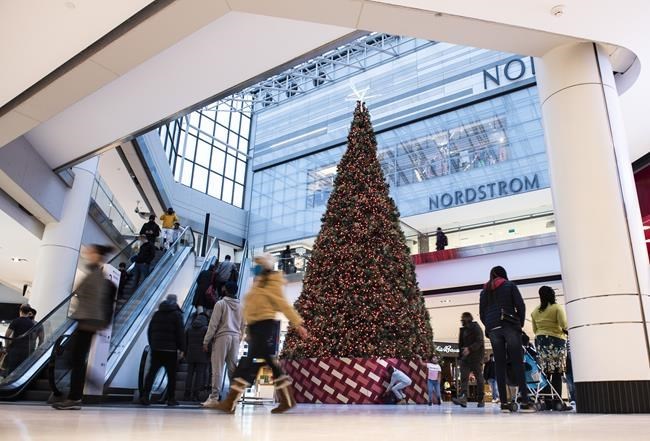TORONTO — Santa is hearing Christmas wishes from children at malls adorned in holiday regalia, stores are teeming with eggnog and gingerbread treats and a barrage of marketing campaigns are promising the perfect gift is just one credit card swipe away.
But among the usual trappings that come with the holidays are new factors that could shake up the busiest shopping season of the year: inflation, and the high interest rates the Bank of Canada has imposed to fight it.
The combined pressures, with prices up substantially in the last few years and the policy rate at five per cent, threatens to weigh on shoppers' willingness to spend and thus, retailers' profits.
"This is going to be a very challenging holiday shopping season for retailers because the consumer is worried," said Kostya Polyakov,national industry leader for consumer and retail at KPMG in Canada.
"The consumer is feeling that everything is expensive, the consumer is feeling that they don't have enough money for non-discretionary spending."
An online survey from consulting firm KPMG conducted between Oct. 20 and Nov. 2 found 83 per cent of the 1,507 Canadians questioned are being more cautious about what they are spending money on this year compared with last year.
Seventy per cent of those surveyed said they don’t plan on spending as much on discretionary items — travel, apparel, electronics, entertainment, toys, and restaurants — as they did in previous years and 66 per cent indicated they plan to only spend on essential goods such as groceries, personal care products and prescriptions this year.
The timing of purchases will come down to when they find deals, Polyakov said.
"Consumers will wait until they think it is the absolute lowest price of the season," he said.
Nick Muriella, vice-president of merchandising and supply chain at Toys "R" Us Canada, said the toy giant's customers are increasingly thinking about value and being selective when making purchases.
"We're definitely seeing much more of, 'Let me grab the deal, I'll go home, I'll think through my budget again and then maybe if something else is a great deal, I'll go back out and get it,'" he said.
Some of the chain's most budget-conscious shoppers finished most of their holiday shopping in September or October, he said.
Another group is being drawn in just when they see the retailer offer a great deal and a final segment is expected to make impulse buys in the last 10 days before Christmas.
Over theholiday season, Deloitte predicts the average Canadian shopper will spend $1,347 this year, down 11 per cent from last year. It attributed the fall to shoppers holding off on splurging and being more thoughtful with purchases.
Forty-eight per cent of the more than 1,000 Canadians the consultancy company surveyed planned to buy only what their family needs. Seventy-one per cent will seek items on sale and 29 per cent will seek less expensive retailers to patronize.
While Muriella said shoppers usually experience a "feast or famine" situation around the hottest toy of the year and though supply chain issues have snarled inventory in the past, "that scarcity is not there anymore."
Supply of one of this year's most popular toys — Bitzee, a digital pet made by Spin Master Corp. — is "pretty strong," he said.
The easing of supply chain issues and a focus on value is similarly being seen in the luxury market, said Carolyn Wright, senior vice-president of product at Holt Renfrew.
"(Canadian consumers) will be more careful this holiday season, given the economic climate," she said.
"However, we expect them to make choices that are thoughtful and driven by purpose and value."
Wright sees many customers looking for gifts that are so unique the company often calls them an "unbuyable" experience. Sometimes that means a chance to have a cocktail with the owner of a big brand in store or get a book signed by its famed author.
On an early November earnings call, executives from Spin Master, the Toronto toy maker behind Paw Patrol, Bakugan and Hatchimals, said they expect consumers to purchase very late in the season. They noticed October store sales across the industry were “disappointing” and “well below retailers’ plans."
At Walmart, chief financial officer John Rainey told analysts on its earnings call that by November, sales had turned higher as "unseasonal" weather abated.
However, he considered the sales trends playing out across the season to be "somewhat uneven," giving the company "reason to think slightly more cautiously about the consumer."
That thinking appears to be baked into Costco Wholesale Corp.'s holiday strategy too.
Chief financial officer Richard Galanti told analysts on the company's latest financial call that Costco plans to bring in a few new toys in the last couple of weeks before Christmas.
"If they don't sell through, we're not at risk of having to mark them down dramatically because they're not unique just to Christmas."
This report by The Canadian Press was first published Dec. 5, 2023.
Companies in this story: (TSX:TOY)
Tara Deschamps, The Canadian Press



